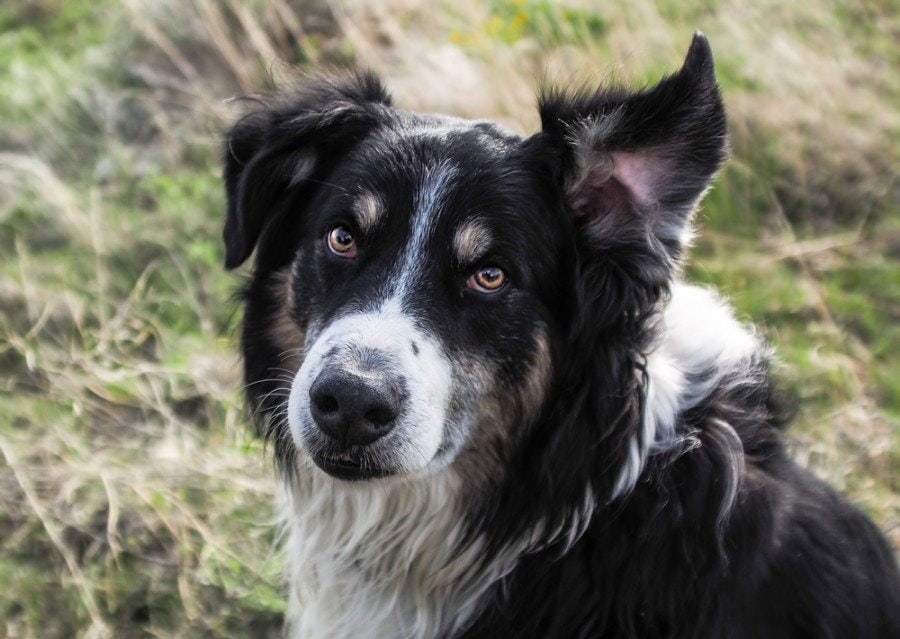Click Below to Skip Ahead
The English Shepherd is a relatively uncommon working breed with a long history as a farm dog, and they’re closely related to the more well-known Border Collie and Rough Collie. This fluffy, medium-sized dog is unassuming but can make a wonderful family dog in the right environment. Keep reading to learn all about the multi-talented English Shepherd.
Breed Overview
Height:
18–23 inches
Weight:
40–60 pounds
Lifespan:
11 years on average
Colors:
Black and white, tan and white, sable and white, black and tan, black with tan and white
Suitable for:
Active, experienced dog people, families with kids
Temperament:
Smart, energetic, eager to please, hardworking, loyal, driven, can be reserved with strangers
The English Shepherd was developed to serve as a farm dog, hunting companion, and livestock guardian, the English Shepherd.
They’re deeply devoted to their owners and rarely want to leave their side. Their intensity, activity level, and intelligence demand a lot of attention and training, and the English Shepherd isn’t a good fit for every household. If you’re interested in the English Shepherd, this article will tell you what you need to know about owning them, along with facts, traits, and history.
English Shepherd Characteristics

English Shepherd Puppies

The American Kennel Club does not currently recognize English Shepherds, and the breed is less common in the United States. Because of that, you’ll most likely need to buy from a breeder if you want to add an English Shepherd to the family. An established English Shepherd Club in the United States maintains a list of breeders.
You can also find dedicated English Shepherd rescue groups if you’re interested in adopting a dog. English Shepherds may also be found in animal shelters, where they’re often misidentified as other breeds or mixed breeds.
Expect an English Shepherd puppy to be clever and active from the beginning. They’re not outgoing dogs, but English Shepherds need regular early socialization with humans and other dogs to ensure they learn to handle new situations appropriately. Establishing daily routines is also vital to helping your English Shepherd puppy adjust to your family.
Intelligent and willing English Shepherds should thrive in puppy obedience classes, and it’s never too early to start their training! Make sure they get plenty of age-appropriate exercise, training, and a well-balanced puppy diet.
Temperament & Intelligence of the English Shepherd
Like most herding breeds, English Shepherds are highly intelligent, generally easy to train, and dedicated to pleasing their humans. They bond extremely closely with their owners and are happiest when spending time with them. This is not the dog for anyone who prefers their pet to give them space. English Shepherds are more likely to act as your shadow instead.
They’re loyal and loving towards their family but can be shy and reserved towards unfamiliar people. They have a protective streak, too. Although they have endless energy, the English Shepherd maintains a calm temperament, making them a wonderful companion dog.
English Shepherds have a strong work drive. They may become bored and destructive without regular mental stimulation. Once they learn their rules and routines, the English Shepherd has little patience for changes or rule-breaking. However, you may spot an English Shepherd trying to herd unruly kids or other dogs.
Are These Dogs Good for Families? 👪
Well-socialized English Shepherds can make fantastic playmates and guardians for kids. They are energetic enough to play with older children all day but not too big to overwhelm smaller kids. As always, you should supervise your children when interacting with the dog.
Due to their herding instincts, some English Shepherds chase and try to herd fast-moving children. Living with an English Shepherd requires a significant time commitment to training, socializing, and exercising the dog, and busy families may struggle to meet their needs.
In addition, English Shepherds are not the best choice for families who live in apartments or dense urban environments. They do best with space to run safely, and a house with a fenced yard is preferred.

Does This Breed Get Along With Other Pets? 🐶 😽
English Shepherds can get along with other dogs when properly socialized. However, they can be bossy if their canine friends aren’t behaving properly. If the other dogs don’t welcome this peer-to-peer correction, a conflict could erupt.
Along with serving as herding dogs, English Shepherds were often used to hunt and guard livestock. Because of that, they may chase cats or harass small exotic pets.
Things to Know When Owning an English Shepherd
Before you start the search for an English Shepherd breeder, you’ll want to be sure you’re as prepared as you can be for life with this breed. Here are the vital characteristics to know when owning an English Shepherd.
Food & Diet Requirements 🦴
Healthy English Shepherds generally don’t have any special diet requirements. You can select a nutritionally balanced food formulated for dogs, either canned or dry. If you want to try a homemade diet for your English Shepherd, consult your veterinarian first to ensure it contains all the essential nutrients.
An English Shepherd’s daily calorie needs will vary depending on how active they are, among other factors. Your vet can help you calculate how much to feed your dog to ensure they stay at a healthy weight.

Exercise 🐕
English Shepherds are high-energy dogs, like most herding breeds. They require daily vigorous exercise to keep them fit and occupied. Without the chance to burn off their energy, English Shepherds can develop problem behaviors like barking, chewing, or digging.
Because of their exercise needs, English Shepherds are not a good match for every household. They are best suited for active owners who enjoy jogging, hiking, or other physical activities. English Shepherds also make amazing canine athletes who can quickly learn to compete in agility, herding competitions, and obedience.
Training 🎾
English Shepherds are typically easy to train thanks to their intelligence, devotion, and loyalty. They enjoy learning and are happiest when they have a task to perform. Keeping an English Shepherd busy takes more than physical exercise; you’ll need to give their brain a workout, too.
Regular training sessions and teaching them to perform tricks or tasks can improve their mental and physical health. English Shepherds respond well to positive reinforcement training techniques. Praise from their owners may even be enough to encourage them without the need for treats.

Grooming ✂️
English Shepherds have a thick, wavy double coat to protect them while working outdoors in cold, wet weather. As a result, they shed heavily on a seasonal schedule. During shedding season, you can expect to brush your dog every day to keep the shedding under control.
When the English Shepherd isn’t actively shedding, they’ll still need to be brushed at least once a week to maintain their coat and prevent tangles. You should trim their nails about once a month and perform regular preventative dental care, such as brushing their teeth. Finally, check your English Shepherd’s ears and clean them as needed.
Health and Conditions 🏥
Perhaps because English Shepherds are a fairly rare breed, they don’t have many known inherited health conditions. Genetic screening and other tests can determine if an English Shepherd is affected by medical issues. As you search for an English Shepherd breeder, look for one who can provide a full health history and screening results for their dogs.
- Progressive retinal atrophy
- Collie eye anomaly
- Hip dysplasia.
- Medication sensitivities due to MDR-1 gene
Male vs Female
Male English Shepherds are generally taller and heavier than females. Males can display behaviors like urine marking, especially if they aren’t neutered. If you have a female English Shepherd, she will go into heat about twice a year unless she’s spayed.
You can talk to your vet about the pros and cons of spaying and neutering and the best age to have the surgery performed.
3 Little-Known Facts About the English Shepherd
1. English Shepherds Can Trace Their Ancestry to the Roman Empire
It is believed that English Shepherds descended from a mix of native British dogs and cattle dogs brought to England when Rome invaded the island in 55 B.C.
2. English Shepherds Have a Long History in The United States
Despite not being recognized by the American Kennel Club, English Shepherds likely came to the United States alongside British settlers. The multi-talented breed was especially useful to the settlers because they could serve as a working farm dog and a vigilant guard dog.
3. English Shepherds Are Known by Many Other Names
Over the years, English Shepherds have been known by many other names. Farm Collie, Farm Shepherd, Old Fashioned Collie, Black Shepherd, Ring Tailed Shepherd, and Ring Necked Shepherd have been used throughout their history.


Final Thoughts
As you can see, the English Shepherd might not be the most glamorous or well-known breed, but they have a lot to offer to the right owner. If you’re looking for a dog to compete in canine sports, join you on long hikes, or patrol the borders of your hobby farm, the English Shepherd might be the dog for you.
However, you’ll need to be patient when it comes to bringing one home. As we mentioned, the English Shepherd is rare in the United States, and even when you find a breeder, there could be a waiting list for puppies.
Featured Image Credit: Jennifer McCallum_shutterstock










